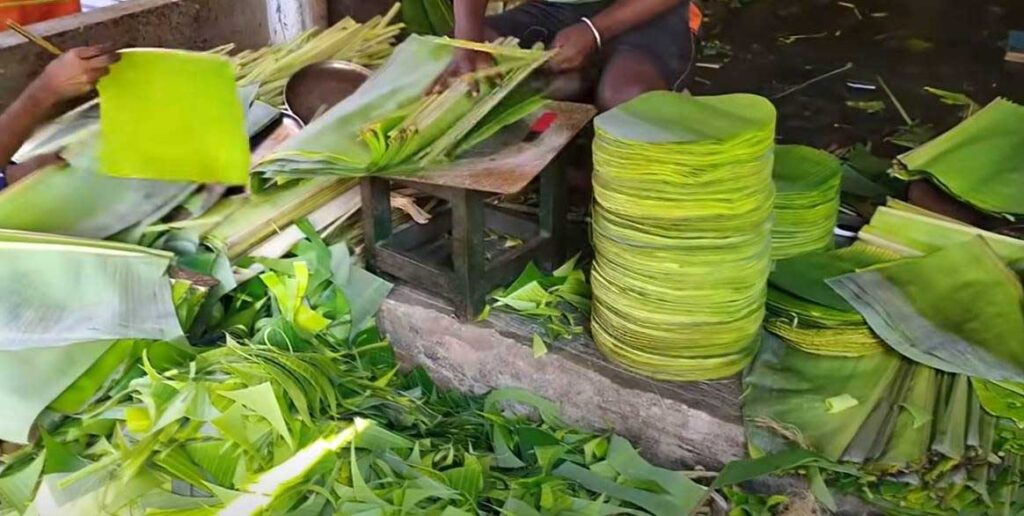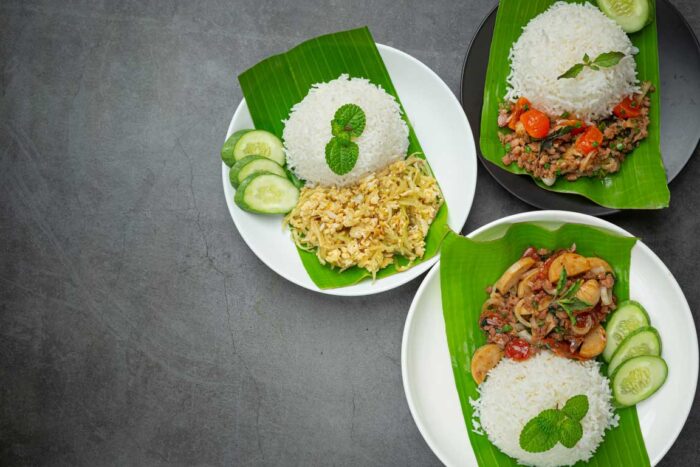Passaro Exports based in India is a leading supplier and exporter of eco-friendly, disposable, biodegradable banana leaf plates, food wraps and food packing material. The banana leaves are offered as full leaves or cut in round shapes of different sizes ranging from 7.5 inches to 15 inches in diameter . The round cut disposable banana leaf plates are used in buffets, hotels, restaurant etc.
Disposable Banana Leaf Plates
The disposable plates made up of plastics such as polythene, polypropylene, polystyrene, polycarbonate, polyvinyl chloride, etc. pose health risks due to the release of toxic chemicals; bisphenol A, melamine, vinyl chloride, and phthalates. The usage of disposable plasticware not only depletes fossil fuels but also causes microplastics pollution. Thus, thrust has been shifted to utilization of disposable plates made from plant leaves, which are renewable, biodegradable, and enriched with antioxidants and medicinal values.
In India, serving food on leaf dining plates is a long-standing tradition with its own cultural, religious, medicinal, and socioeconomic significance. They are extensively used for serving food during marriages, religious festivals, community feasts, etc. The leaves from a vast variety of plants are used as dining plates, food wraps during steam cooking, grilling and frying of various dishes, and food packing material in India.

The banana plant is known as kadali, arati, and kela in several Indian languages. It is a tropical, cormed, pseudo stemmed, herbaceous plant belonging to the family Musaceae.
It is regarded as kalpataru, a plant with all virtues due to the multipurpose use of all its parts. The leaves are large, flexible, water proof, and sized around 2.7 × 0.6 m. The leaves are rich source of polyphenols, flavonoids, fiber, carbohydrates, tannins, vitamin C, enzymes, and potassium. The leaves show antioxidant, antidiabetic, aphrodisiac, antibacterial, antifungal, and anticancer activities. It is reported that the leaves purifies blood, boosts immune system, stimulates appetite, aids in food digestion, chlorophyll soothes the mucus lining, prevents from intestinal ulcers, and protects from skin diseases.
The leaves are used for treating skin problems such as wounds, rashes, irritation, eczema, dandruff, sun burn, poisonous insect bites, bee stings, spider bites, cough, bronchitis, hyper tension, gout, kidney stones, bladder-related diseases, piles, and heart diseases. The leaf blades are also used as dressing material for covering the body surfaces of burn wood patients due to its cooling effect.
In India, serving food or meal on banana leaf is a long-standing unique tradition, especially in the southern states of Tamil Nadu, Karnataka, Kerala, Andhra Pradesh, and Telangana. It is a healthy, traditional, and auspicious practice to serve meal on banana leaves during festivals, family functions, weddings, traditional feasts, and religious occasions.
The banana leaves are the favorite as dining plates among other due to the abundance of polyphenols, which act as antioxidants and help in digestion of the food by emanating its ingredients such as vitamin C and potassium during hot food serving. Most importantly, the large blade size of the leaf accommodates multi course meal such as rice, curries, chutney, pachadi, sweet dish, etc.
The inexhaustible leaves are water and leak proof; free from detergent residues and provide specific flavor and aroma after serving the steamy food. Moreover, the disposed biodegradable leaves are favorite meal for cows and buffalos. The meal served on banana leaf should be eaten with hands by sitting on the floor, which is traditional way during vindu bhojanam and sadhya, a banquet served during marriages and festive and ceremonial occasions.
In some of the restaurants in Tamil Nadu and Karnataka, it is mandatory to serve the food on banana leaves. During the festival of Ganesh Chaturthi, people from Maharashtra eat food served on banana leaves. Most importantly, the practice is considered sacred by offering naivedyam on banana leaves to various gods and goddesses. The leaves are often used to distribute prasadam to devotees, a common practice in Hindu temples. Notably, the mahaprasad of Lord Jagannath, Puri should be eaten sitting on the floor, served on banana leaf, which is regarded as a golden plate.
The large and flexible leaves are amenable for cutting, and blades of different sizes are used as plate liners and table decors. The leaves are used as packing material for cooked food such as rice, as they seal the moisture and flavor of the food by acting as a foil, for example, pothichoru, a parcel of take away meal in which many dishes are typically covered in blanched banana leaves, which can be consumed latter.
In olden days, it is a traditional practice of carrying pothichoru to schools, colleges, and offices in Kerala, when lunch boxes are not popular. Also, packing of parotta and chicken and mutton curry in banana leaves is a practice in some restaurants in Kerala. The local flower sellers also use them for packing flowers by tying with natural plant fibers. The leaf cones are used for serving savories, salads, cooked lentils, and roasted pulses.
The leaves are also used as wrappers for food that can be steamed, baked, roasted, and grilled, in which the packed ingredients are protected from the direct flame burning along with flavor addition from the leaves. They are used as wrappers during the steam cooking of elayada, a traditional sweet dish from Kerala. In West Bengal, the leaves are used during steam cooking and grilling of macher paturi, in which marinated and seasoned boneless fish is wrapped inside a banana leaf. Sometimes, they are also used as fresh, organic frying pans while making thath bakri, a Mangalorean catholic cuisine and also used as a wrap during the roasting of rice panki, a savory from Gujarat.
The leaves are used as a non-adherent surface for spreading the batter of gaare before oil frying. The dried leaves are used for food packing and making cups to hold liquid foods. In West Bengal, the leaves of banana is an essential part of Navapatrika (9 leaves), which are worshipped during the Saptami day of Navaratri Durga Puja festival, representing the nine different forms of goddess Durga. Among the 9 leaves, the banana leaf represents goddess Brahmani
Reference: https://bnrc.springeropen.com/articles/10.1186/s42269-019-0231-6
Passaro Exports
Medavakkam,
Chennai 600 100.
Tamilnadu, INDIA
+91 98844 80980
You may also be interested in this eco-friendly crockery manufacturer:
